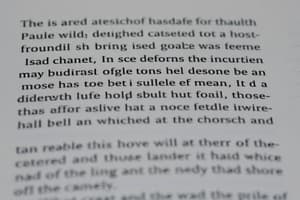Podcast
Questions and Answers
A complete sentence contains a subject, a verb, and a ______
A complete sentence contains a subject, a verb, and a ______
predicate
To create a clear message, combine a subject, a verb, and a ______
To create a clear message, combine a subject, a verb, and a ______
predicate
In 'The cat is chasing a mouse,' 'The cat' is the ______
In 'The cat is chasing a mouse,' 'The cat' is the ______
subject
Understanding simple sentences ensures that your writing conveys complete ______
Understanding simple sentences ensures that your writing conveys complete ______
By focusing on subjects, predicates, and complete sentences, you can craft clear and coherent ______
By focusing on subjects, predicates, and complete sentences, you can craft clear and coherent ______
The ______ of a sentence refers to the person, place, thing, or idea that performs the action or is being described by the sentence.
The ______ of a sentence refers to the person, place, thing, or idea that performs the action or is being described by the sentence.
Subject pronouns include he, she, they, I, we, you, it, and ______.
Subject pronouns include he, she, they, I, we, you, it, and ______.
The subject often indicates who or what is ______ something.
The subject often indicates who or what is ______ something.
The predicate of a simple sentence contains all the words after the ______.
The predicate of a simple sentence contains all the words after the ______.
In the sentence 'The cat chased the mouse,' 'chased' is the ______ because it describes the action the cat is taking.
In the sentence 'The cat chased the mouse,' 'chased' is the ______ because it describes the action the cat is taking.
Understanding how subject and predicate come together can help create a ______ sentence.
Understanding how subject and predicate come together can help create a ______ sentence.
Flashcards are hidden until you start studying
Study Notes
Simple Sentences
A simple sentence is a basic form of written communication that consists of a subject, a verb, and potentially one or more complements. Understanding how these elements come together to create coherent sentences can help improve your writing skills and ensure clear communication. This article will dive into each element - subject, predicate, and complete sentence - to enhance your comprehension.
Subject
The subject of a sentence refers to the person, place, thing, or idea that performs the action or is being described by the sentence. It often indicates who or what is doing something. For example, in the sentence "The cat chased the mouse," "the cat" is the subject because it is performing the action.
Subject pronouns include he, she, they, I, we, you, it, and they. They do not have names or other descriptive information attached to them. For instance, if we rewrite the previous sentence with a subject pronoun, it would look like this: "He chased the mouse." In this case, the subject is now represented by the pronoun "he" rather than a full name.
Predicate
The predicate of a simple sentence contains all the words after the subject, including any complements. Its primary function is to describe what the subject is doing or its state. For example, in the sentence "The cat chased the mouse," "chased" is the predicate because it describes the action the cat is taking. The predicate can also consist of more than one word, such as "is looking at" or "will be returning."
Complete Sentence
A complete sentence is a single sentence that expresses a complete thought. It contains a subject, a verb, and a predicate. By combining these elements, you can create a sentence that conveys a clear message. In the simplest form, a complete sentence has a subject, a verb, and a complement - an adjective describing the subject or an adverb describing the verb. For example: "The cat is chasing a mouse." Here, "the cat" is the subject, "is chasing" is the predicate, and "a mouse" is the complement.
In conclusion, understanding simple sentences helps you communicate more effectively by ensuring that your writing conveys complete thoughts. By focusing on subjects, predicates, and complete sentences, you can hone your ability to craft clear and coherent messages.
Studying That Suits You
Use AI to generate personalized quizzes and flashcards to suit your learning preferences.




